 By Pepper Parr
By Pepper Parr
March 19th, 2023
BURLINGTON, ON
This is a multi-part series on what members of Council thought about becoming Deputy Mayors with a Portfolio.
In part 1 of this ongoing series about the six members of Council being made Deputy Mayors, facilitator Suzanne Gibson had five questions:
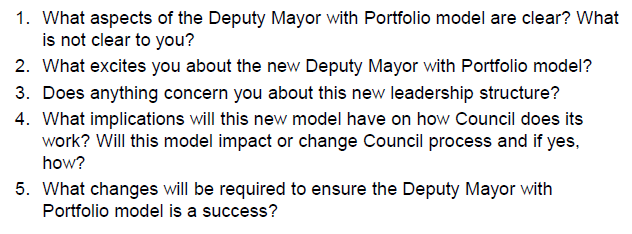

Suzanne Gibson guiding members of Council through an understanding of what they would so as Deputy Mayors
Gibson explained that the “intention behind those five questions is to get you to dig into the into the new model, to think about the implications, to share your concerns, to share what excites you.
“We’re going to dig into these a bit and see if we want to add more clarity because you know you’re starting with something new. The more clarity around principles and roles, the more effective and efficient the process will work. So I’m going to let you speak to how these came up both the principles and the roles.”
Each member of Council was given an opportunity to talk about the role was as they saw it and how they would serve as Deputy Mayors.
Meed Ward had explained earlier that serving as Deputy Mayors meant they would be focused on the interests of the city and not just their ward, using the lens of their portfolio is as a guide.
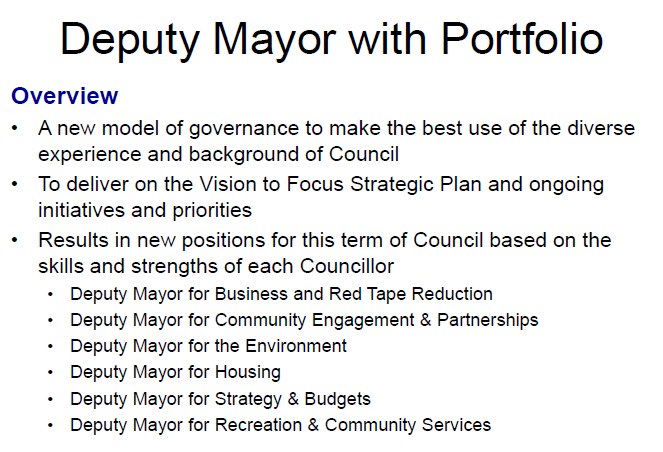
The questions they were asked to reflect on was – just what does it mean to you to be a Deputy Mayor ? During my discussions with two of the newly elected Council members in their term in office they talked about how they saw their future in municipal politics: both said they could see themselves serving as Mayor at some point.

How would council members, working as Deputy Mayors, determine what they could and could not do? Those principles were set out and debated.. This “bigger picture” role for Deputy Mayors will be interpreted differently based on their individual past experiences and their levels of sophistication. Expect some unintended consequences as this goes forward. .
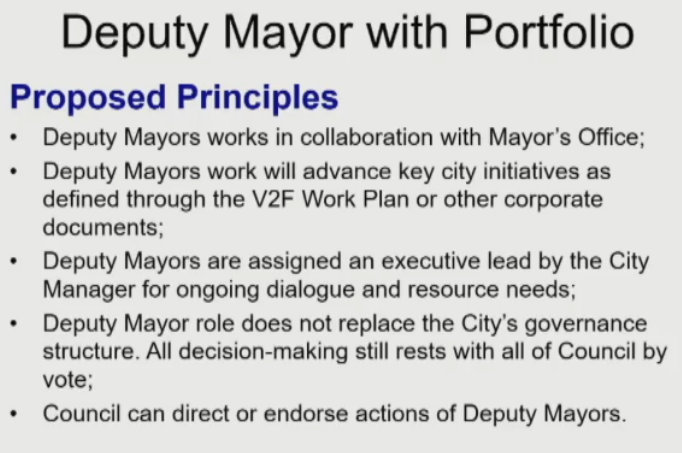
City Clerk Kevin Arjoon and his staff were taking notes that would be used in the report they would bring back to Council later in the year.
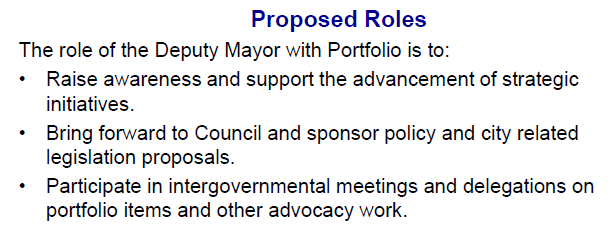 It did sound somewhat complicated but as the council members worked their way through the hour and a half they had it began to come together.
It did sound somewhat complicated but as the council members worked their way through the hour and a half they had it began to come together.
An added objective was a commitment Council members would make to each other.

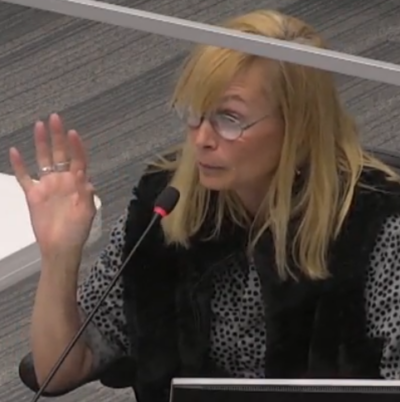
Suzanne Gibson directing council members through a complicated process. She managed to keep them on topic – most of the time.
How were the council members to work out their differences as they went through each part of the process Gibson had put in place ? She introduced a five finger vote approach to get a sense as to just where each member of council stood on working through the proposed roles and principles.
Gibson wanted to steer clear of majority votes and used the five fingers to see where some change in position might be possible – and for the most part it worked.
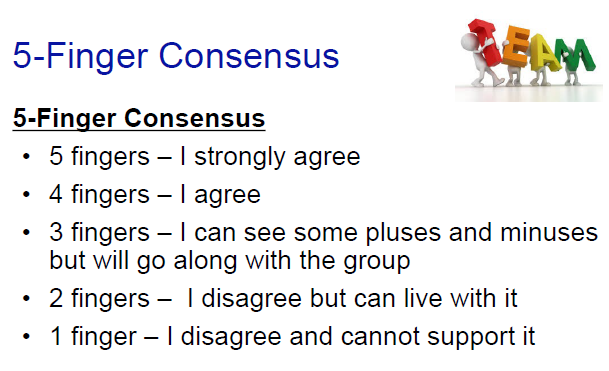
It sounded complex but as the conversations continued one could get a pretty good idea as to how each member of Council was going to carry out the role of Deputy Mayor.
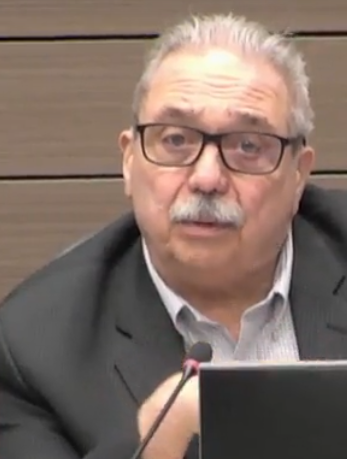
Ward 6 Councillor Angelo Bentivegna: No magic wand
It was clear that each Council member had taken to the idea of being a Deputy Mayor. Ward 6 Councillor Angelo Bentivegna said he found that many people he talked to thought all a Council member had to do was wave a magic wand and what they wanted would be done. “I had to explain to people that that wasn’t the way this was going to work”. he said
Ward 1 Councillor Kelvin Galbraith was pumped about the new role and commented that he was already talking to people about issues that were city wide.
The next step in this series is to look at what each member of Council had to say as they worked through what their portfolio was, what the principles were, what the proposed roles would require of them and how well they handled the commitment they were making to each other.
Using the five finger vote had a caution – when it was a one finger vote – which finger would they be using.
Next we will cover what Councillors Nisan and Galbraith had to say, followed by Sharman and Bentivegna and then Kearns and Stolte
It was quite an exercise – we heard more about how the Councillors see themselves performing than was heard during the election that put every one of them back in office for a second term.
Some people will say: If I only knew then what I know now.
Indeed.
Related stories:
Part 1 – What the Mayor was setting out to do.















Perhaps Bentivegna the Deputy Mayor for Jo Brant should be asked whether he intends to get together with the Burlington MPPs and see how they can tackle yet another scathing report on Jo Brant hospital which we know is the tip of the iceberg as most of the issues never get discussed with rhe media such as Frketich.
We recently had the need to call the paramedics believing we needed ER services we were terrified to go to JB but it was what we thought was anER need that was justified and may well have serious consequences. Fortunately the paramedics these days are more than ambulance drivers and reassured us we were not dealing with something that was life threatening and the visit was averted and slowly recovering.
If the Deputy Mayor role is indeed one that Bentivegna believes in surely this issue that affects us all is one he should run with The province has taken over the management of other hospitals in the past and sorted them in this case however we believe the community needs to have its say pubicly as to what is wrong at JB causing unnecessary deaths, pain and suffering that we pay to be a place of healing and comfort when healing is not possible and must be fixed. The almost 2 decades of downhill healthcare services at JB must be reversed.
Anne,
Councillor Bentivenga is the council representative on the board at JB.
It has nothing to do with his role as Deputy Mayor.
Given his dread at reading 400 pages of reports for council meetings he should fit right in at JB. They haven’t published their agenda’s in almost a year and they don’t minute meetings.
I have a few questions of my own as to the purpose of the Deputy Mayor roll out.
Was it?
1 To empower councillors to get things done better or faster, or for some other reason?
2 To delegate, download, or spread the responsibility for the success/failure of each mandate?
3 To break down silos?
4 For personal development and growth?
5 None of the above just a good outside the box idea?
According to Deborah Grayson Riegel here are “8 Ways Leaders Delegate Successfully”
1 They pick the right person.
2 They’re clear about what the person is responsible for and how much autonomy they have.
3 They describe the desired results in detail. This includes setting clear expectations about the outcome (“what it is”), how the task fits into the bigger picture (“why we’re doing it”), and criteria for measuring success (“what it should look like when done well”).
4 They make sure that team members have the resources they need to do the job, whether it’s training, money, supplies, time, a private space, adjusted priorities, or help from others.
5 They establish checkpoints, milestones, and junctures for feedback so that they neither micromanage nor under-lead.
6 They encourage new, creative ways for team members to accomplish goals. It’s important for delegators to set aside their attachment to how things have been done in the past, so that they can invite, recognize, and reward novel approaches that work.
7 They create a motivating environment. Successful delegators know when to cheerlead, coach, step in, step back, adjust expectations, make themselves available, and celebrate successes.
8 They tolerate risks and mistakes, and use them as learning opportunities, rather than as proof that they shouldn’t have delegated in the first place.
Deborah Grayson Riegel is a professional speaker and facilitator, as well as a communication and presentation skills coach. She teaches leadership communication at Duke University’s Fuqua School of Business and has taught for Wharton Business School, Columbia Business School’s Women in Leadership Program. She is the author of Overcoming Overthinking: 36 Ways to Tame Anxiety for Work, School, and Life and the best-selling Go To Help: 31 Strategies to Offer, Ask for, and Accept Help.
Well, so much for the “8 ways leaders delegate successfully” here in Burlington city council! 0/8 …. ?